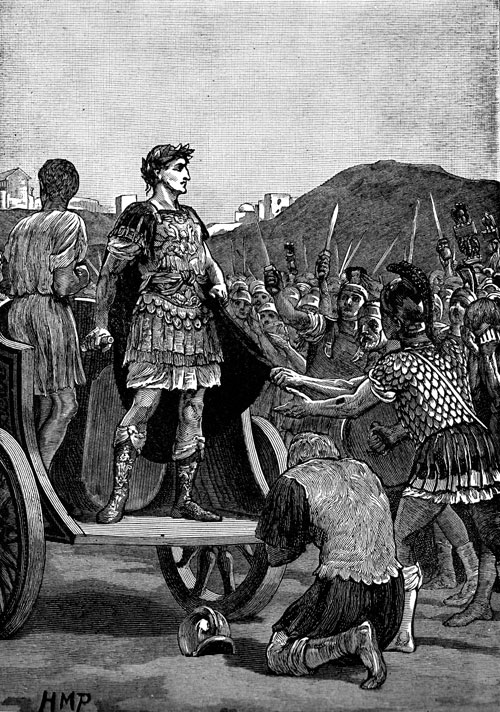There are various themes in the play: the main one being the acts of persuasion between the different characters in Julius Caesar. The "most evil" conspirator, Cassius, is a master of persuasion and he convinces Brutus to join him in the conspiracy against Caesar. Brutus is essentially the main character of the play, and he appears to be the tragic hero.
Although Brutus is a strong and intelligent being, there is an evident nuance between him and Cassius: he still falls under Cassius's hand because Cassius--an even more intelligent individual--is able to out-wit Brutus and adamantly convince him of the dangers of Caesar's growing power: "No, Caesar hath it not; but you, and I and honest Casca, we have the falling-sickness"(1.2.252-254). This quote exemplifies Cassius's ability to entice Brutus into the mindset that him and his comrades are weak mortals compared to the almighty Caesar, and as a result, Brutus starts to think that perhaps he is falling under the reign of Caesar--in a negative way. Thus, Brutus is somewhat justified in his motives to assassinate Caesar.
Acts of persuasion--seen in Julius Caesar--can lead to horrible results, which people inadvertently condone themselves for, because they were persuaded, or brainwashed, to do so. One example of this is the way in which the media (television, magazines, movies, and music) persuades teenagers--specifically girls--into altering their lifestyle and day-to-day habits in order to become more like a model or movie star.
The ads and campaigns in the world are essentially persuading young girls to change themselves in order to be "beautiful", which is ultimately similar to the way Cassius persuades Brutus to assassinate Caesar in order to be "powerful".
Another theme in Julius Caesar is the prevalence of character faults. Each character in the play suffers from an "unattractive" quality, or one which degrades their character a little less. For example, Caesar is extremely egotistical and as a result, he is liked less by those who personally know him--forming rancors towards Caesar. Caesar believes that he is extolled by all, immortal, god-like, and he thinks that he possesses greater power than anyone else--he even erects monuments throughout Rome in honor to himself. The day of Caesar's assassination, he is warned by his wife to stay home, but Caesar says "Yet Caesar shall go forth; for these predictions Are to the world in general as to Caesar"(2.2.29-30). This quote personifies the carelessness Caesar shows towards his wife's thoughts and feelings, and his eagerness to go to the capitol is simply due to the fact that he is going to be crowned king, demonstrating the true cares of Caesar. And as a result of this carelessness, Caesar was forced to face his inexorable fate.
It is this egotistical nature that prompts Cassius to recognize the "threat" Caesar may bring to Rome, because perhaps Caesar wasn't interested in the well-being of Rome, but simply the well-being of himself, and his wealth, glory, and power.
Although Brutus is a strong and intelligent being, there is an evident nuance between him and Cassius: he still falls under Cassius's hand because Cassius--an even more intelligent individual--is able to out-wit Brutus and adamantly convince him of the dangers of Caesar's growing power: "No, Caesar hath it not; but you, and I and honest Casca, we have the falling-sickness"(1.2.252-254). This quote exemplifies Cassius's ability to entice Brutus into the mindset that him and his comrades are weak mortals compared to the almighty Caesar, and as a result, Brutus starts to think that perhaps he is falling under the reign of Caesar--in a negative way. Thus, Brutus is somewhat justified in his motives to assassinate Caesar.
Acts of persuasion--seen in Julius Caesar--can lead to horrible results, which people inadvertently condone themselves for, because they were persuaded, or brainwashed, to do so. One example of this is the way in which the media (television, magazines, movies, and music) persuades teenagers--specifically girls--into altering their lifestyle and day-to-day habits in order to become more like a model or movie star.
The ads and campaigns in the world are essentially persuading young girls to change themselves in order to be "beautiful", which is ultimately similar to the way Cassius persuades Brutus to assassinate Caesar in order to be "powerful".
Another theme in Julius Caesar is the prevalence of character faults. Each character in the play suffers from an "unattractive" quality, or one which degrades their character a little less. For example, Caesar is extremely egotistical and as a result, he is liked less by those who personally know him--forming rancors towards Caesar. Caesar believes that he is extolled by all, immortal, god-like, and he thinks that he possesses greater power than anyone else--he even erects monuments throughout Rome in honor to himself. The day of Caesar's assassination, he is warned by his wife to stay home, but Caesar says "Yet Caesar shall go forth; for these predictions Are to the world in general as to Caesar"(2.2.29-30). This quote personifies the carelessness Caesar shows towards his wife's thoughts and feelings, and his eagerness to go to the capitol is simply due to the fact that he is going to be crowned king, demonstrating the true cares of Caesar. And as a result of this carelessness, Caesar was forced to face his inexorable fate.
It is this egotistical nature that prompts Cassius to recognize the "threat" Caesar may bring to Rome, because perhaps Caesar wasn't interested in the well-being of Rome, but simply the well-being of himself, and his wealth, glory, and power.
Today, many people debate over the so-called egotistical nature of those in politics, such as presidents, senators, and legislators. Some say these people are simply out to improve their own positions in government, other than striving to improve the actual government and country itself.
This article can compare to Caesar's situation, in that these senators possess numerous monuments to themselves, much like Caesar's own monuments. And as a result, both of their motives are being questioned.




No comments:
Post a Comment